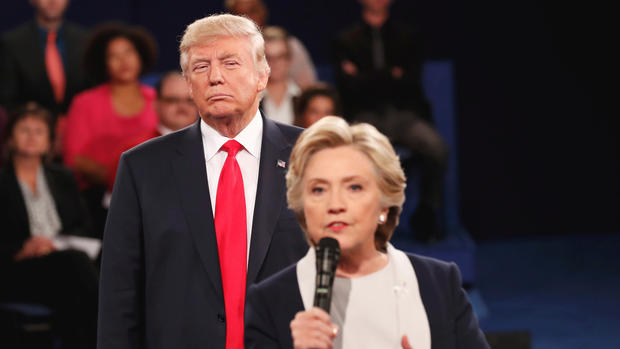In Defense of Choosing “None of the Above”

Republican U.S. presidential nominee Donald Trump listens as Democratic nominee Hillary Clinton answers a question from the audience during their presidential town hall debate at Washington University in St. Louis, Missouri, U.S., October 9, 2016. REUTERS/Rick Wilking TPX IMAGES OF THE DAY
Over the weekend Forum Communications Company (for whom I am an employee, I should note) announced their endorsement for the presidency which was carried in all of their newspapers including their flagship the Fargo Forum.
The paper traditionally has endorsed Republicans for the White House, but for the first time since Goldwater-LBJ race in 1964, the Forum endorsed “none of the above.”
“[W]e withhold an endorsement, and urge voters to vote their conscience and their values first, their political persuasions a distant second,” the paper wrote.
I was glad the paper took this position. It’s the right one I think, though many don’t think so.
I took a similar position earlier this month, going a step further and proposing an actual “none of the above” option on our ballots. “It would allow those of us who are informed, and who have considered the relative merits of the candidates, to differentiate ourselves from the people who are too lazy to vote at all,” I wrote at the time.
The most common objection I’ve heard to this position is that not voting is a de facto vote for one of the other candidates. Or a pointless exercise in narcissism since one of the candidates is going to win the election regardless.
I disagree. The inevitably of election outcomes is not, in my mind, a good enough reason to vote for a reprehensible candidate. And the options on the national ballot this cycle run from incoherent Trump to corrupt Clinton, from clueless Johnson to crazy lady Stein.
Your mileage with these candidates may vary, of course, and that’s fine. We don’t have to agree on the candidates. Nor is there anything wrong with voting for a flawed candidate you feel is the best overall option.
I get the logic in that. It’s one way to go. But choosing a candidate doesn’t have to be the only way to go.
If none of the candidates past muster, from your point of view, there is nothing dishonorable about choosing none of them.




